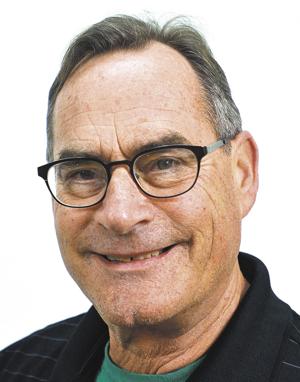
OLYMPIA — As Washington’s roads continue to deteriorate and transportation funding faces significant challenges, Rep. Andrew Barkis, R-Olympia, is calling for a public hearing on House Bill 1324. This proposed legislation aims to redirect excess revenues from the Climate Commitment Act toward urgent road projects, seeking to alleviate a growing infrastructure backlog that currently exceeds $11 billion, according to a statement from Barkis.
Under present law, proceeds from CCA allowance auctions are earmarked for critical climate projects, which include enhancing clean transportation alternatives, boosting climate resilience in ecosystems and communities, and addressing environmental justice and health disparities in Washington. However, Barkis argued that the pressing need for improved infrastructure warrants reevaluating these funding restrictions. “Washington’s roads are in dire need of repair,” Barkis, the bill’s primary sponsor, wrote in the statement.

“We rank 47th nationally in road quality, face an increasing number of bridges in poor condition, and have a highway system in the early stages of failure.” He emphasized that these concerns impact millions of Washingtonians who rely on the state’s infrastructure for their daily commutes. The proposed legislation, introduced to the legislature on Jan.
16, would allow excess CCA funds to be utilized for significant transportation projects, including but not limited to the replacement of the Interstate 5 Bridge over the Columbia River, the completion of the US 395 North Spokane Corridor, the finishing touches on the SR 520 Bridge and the Gateway Freight Project, which links SR 509 and SR 167 to essential ports in King and Pierce counties. However, Katy Ricchiuto, policy director for Transportation Choices Coalition, said the bill could be damaging to the Climate Commitment Act. “Washingtonians overwhelmingly voted to protect the Climate Commitment Act when they rejected Initiative 2117,” Ricchiuto wrote in an email to the Columbia Basin Herald.
“Climate Commitment Act funds need to go to what legislators promised and what voters supported. That’s more bus service for working families, more paratransit service for seniors, and free youth transit. Nearly 10 percent of Grant Transit Authority’s budget comes from this funding.
HB 1324 is an attempt to take that away.” Transportation Chair Rep. Jake Fey, D-Tacoma, expressed a similar sentiment to Ricchiuto.
“Investing in our transportation system is critical, but those investments must align with our commitment to reducing emissions,” Fey wrote to the Columbia Basin Herald. “That’s why funds from the Climate Commitment Act can only be used for projects that actively cut greenhouse gas emissions and support a cleaner, more sustainable future for Washington.” The bill is backed by Sam Low, R-Lake Stevens; Suzanne Schmidt, R-Spokane Valley; Daniel Griffey, R-Allyn; Travis Couture, R-Allyn; Jenny Graham, R-Spokane; John Ley, R-Camas; Mike Volz, R-Spokane; Matt Marshall, R-Eatonville; Jim Walsh, R-Aberdeen; Joshua Penner, R-Orting; Michael Keaton, R-Puyallup; Mark Klicker, R-Walla Walla; Ed Orcutt, R-Kalama; David Stuebe, R-Washougal; Tom Dent, R-Moses Lake; April Connors, R-Kennewick; Peter Abbarno, R-Centralia; Hunter Abell, R-Inchelium; Cyndy Jacobsen, R-Puyallup; Michelle Caldier, R-Gig Harbor; Stephanie Barnard, R-Pasco; and Andrew Engell, R-Colville.
Barkis acknowledged the support for the Climate Commitment Act but contends that the additional revenues should not be restricted solely to projects focused on environmental issues. “Despite these pressing concerns, which affect millions of Washingtonians, we are told Climate Commitment Act funds must only ever be directed toward projects that address things like environmental justice,” he wrote. Recent census data highlights the need for infrastructure improvements, with more than 82 percent of Washington residents relying on cars, trucks, or vans for their commutes.
In some counties, the reliance on personal vehicles exceeds 93 percent. Public transit constitutes just over 6 percent of all commutes statewide while walking and biking account for less than five percent combined. Barkis asserts that investing in transportation infrastructure is essential rather than diverting funds away from these needs through narrow funding restrictions.
“We can fund major projects with existing revenue sources, but only if we’re willing to get creative,” Barkis wrote. “Asking Washingtonians to pay more at a time when our state has the third-highest gas prices, the fifth-most expensive gas tax, and one of the highest costs of living in the country is not the answer.” While some legislative Democrats are advocating for increased gas taxes or the implementation of a new road usage charge, Barkis warns that these measures would only add to the financial burdens faced by Washington residents.
“With 35 percent of Washington households living paycheck to paycheck, we need to prioritize fixing our roads and bridges without adding to the financial burden families are already facing,” he wrote. The bill currently awaits a hearing in the House Transportation Committee. “I will continue urging the committee chair to give the bill a hearing so Washingtonians can make their voices heard,” Barkis wrote.
.















